Mon 10 Sep 2012
ELSEWHERE ON THE WEB, by Mike Tooney: DOROTHY L. SAYERS – The Unpleasantness at the Bellona Club.
Posted by Steve under Reviews[9] Comments
DOROTHY L. SAYERS – The Unpleasantness at the Bellona Club. Ernest Benn, UK, hardcover, 1928. Payson & Clarke, US, hardcover, 1928. Reprinted extensively in both hardcover and paperback.
“Today is perhaps also a suitable occasion to recall a classic detective story which not only opens on Armistice, or Remembrance Day, but in which the coincidence of events on that particular day is absolutely crucial to the story. The book in question is The Unpleasantness at the Bellona Club, by Dorothy L. Sayers.”
— Martin Edwards, “Do You Write Under Your Own Name”
http://doyouwriteunderyourownname.blogspot.com/2008/11/remembrance-day.html
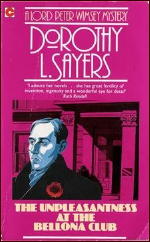
“The story of The Unpleasantness at the Bellona Club breaks into two halves, with each half functioning as a more or less independent novella. The first and better half, consisting of Chapters 1-12 and the start of the succeeding chapter, contains a real puzzle plot. The first half is also rich in genuine detection.
“In fact, nearly 100% of this section consists of following Wimsey on his detective efforts. Wimsey’s detective work shows the influence of Sayers’ ancestors in the realist school. … Sayers uses formal, abstract, non-naturalistic chapter titles in this book, in this case based on Bridge hands. Such a technique will become common in later Golden Age writers, especially Ngaio Marsh.”
— Mike Grost
http://mikegrost.com/sayers.htm
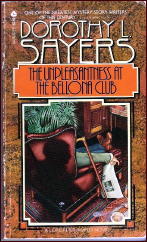
“The Bellona Club is a men’s club. One of the members is discovered to have passed away, apparently while sitting in his chair reading a newspaper. Since the General is known to have a heart condition, it doesn’t appear to be very much out of the ordinary. But when attendants move him, they discover that, although rigor mortis has set in and he is stiff as a board, his knee joint hinges easily. This decidedly suspicious condition indicates that the body was forced sometime after rigor mortis began.
“Lord Peter is called upon to investigate and unearths some startling facts. The General’s sister, it seems, died on the same day at precisely 11 a.m. — and she has a will with the following clause: If the General predeceases her, her entire (and considerable) estate goes to one party; if she dies first, then the estate goes to another. It is clearly established when the sister died — but did the General die before her or after her?”
— Drew R. Thomas
http://www.worlds-best-detective-crime-and-murder-mystery-books.com/lord-peter-wimsey.html
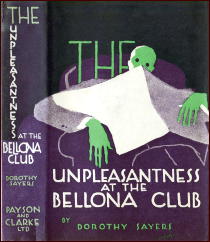
From The Saturday Review, 27 October 1928:
“THE UNPLEASANTNESS AT THE BELLONA CLUB. By Dorothy Sayers. S. Payson & Clarke. 1928. $2.00.
“This should have been a pretty good detective story. Its crimes, and the motives out of which they spring, are comparatively reasonable. General Fentiman, grandfather — not uncle, as the jacket-blurb-writer wrongly guessed — of Major Robert and Captain George Fentiman, was found dead in a smoking-room chair at the club. He had been dead for some hours. His wealthier sister died the same morning. Because of her will it was important to learn which had died first. Later it developed that dirty work, even murder, had been done; but this development comes too late. That’s what’s the matter with The Unpleasantness at the Bellona Club. All its developments come just a little too late to knock the reader off his chair: he is given plenty of time to foresee most of the book’s twists and turns, and he needs no great nimbleness to keep anywhere from one to six chapters ahead of the story.”
http://www.unz.org/Pub/SaturdayRev-1928oct27-00301
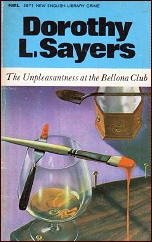
“[Ian] Carmichael’s Wimsey is ever the aristocrat, here ready to quote W. S. Gilbert and W. Shakespeare (though not nearly as frequently as Rumpole will quote his favorite poets), even though he must apologize now and then for being over the heads of some of his less well-educated acquaintances. In this story the grinding poverty of one of the interested parties is shown in striking contrast to Wimsey’s luxurious accommodations and ability to be very generous with his money (which after all was never earned by any workaday sweat of his brow).”
— Frank Behrens, IMDb, Review of the 1972-3 TV miniseries
http://www.imdb.com/title/tt0068146/reviews
http://www.imdb.com/title/tt0068146/
“Another fine piece of detection by an expert, with usual great dialogue, characterization and humor. It’s a shame Dorothy stopped writing so soon.”
— Xavier Lechard
“However, despite the brilliant evocation of
the stodgy Bellona Club and the contrasting Bohemian London, and the good characterisation … the book is ultimately a disappointment …”
— Nick Fuller
http://gadetection.pbworks.com/w/page/7932286/The%20Unpleasantness%20at%20the%20Bellona%20Club
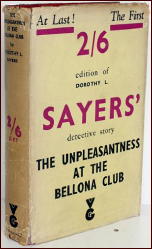
“… The Unpleasantness became my favorite of the series so far. I liked the plot, the elaborate crime and twists, but above all I liked the portrait of post-war England, in particular the experiences of the soldiers who returned. Together with the first decade of the 20th century, my favorite historical period is the Interwar. The Innocence and the end of it.”
— “The Sleepless Reader”
“This is a book in two parts, perhaps not intentionally so, but that is how it reads. I read the first half with very little interest, almost with hostility. The clues seemed as subtle as neon lights in the Club, they pointed in only one direction, and the storyline plodded steadily towards it. I felt an antipathy to the tone of the book. I disliked the way the younger characters were unpleasantly cynical and condescending, not only to their elders but to anyone different to themselves. And I didn’t take to the flippant, wealthy Lord Wimsey. His investigations seem unhampered by the constraints of time and money. In this story he alone is right, and he is always right. His every conjecture is spot on, like a man getting heads with every throw.
“And then somewhere towards the middle of the book, you turn a page and find the story suddenly springs to life.”
— Karyn Reeves
http://apenguinaweek.blogspot.com/2011/02/penguin-no-5-unpleasantness-at-bellona.html
September 10th, 2012 at 9:01 pm
I suppose I have to confess this sometime, so it might as well be now. I have never read any of the Lord Wimsey novels. Some of the short stories, yes, but the novels, no.
I’ve been told that you ought to read the novels in order, but the outline and the varying opinions of this one intrigue me. I see no reason why I shouldn’t start with this one, if I can easily come up with a copy, and I think I can.
September 11th, 2012 at 10:20 am
I loved to read the detective novels by Sayers when I was a boy. But I never read this novel. So I gave it a try two years ago. The story develops so slowly that I got tired and finished the book after reading two or three chapters, perhaps too early.
September 11th, 2012 at 11:33 am
I used to finish every book I started, even if I had to force myself to do so. I’ve discovered recently, however, that I don’t have to do that. My nightstand is covered with books that once I’ve set them down, I’ve never picked them up again.
September 11th, 2012 at 5:08 pm
The Unpleasantness at the Bellona Club is definitely a good place to start reading Sayers novels. Maybe because its an actual, functioning detective story. Some of the Sayers books drown in romance and upper crust activity – not my cup of tea.
Thank you very much for the link.
September 11th, 2012 at 5:50 pm
“Some of the Sayers books drown in romance and upper crust activity – not my cup of tea.”
This is, of course, the big reason that Sayers is still such a popular author today. I don’t mind romance and upper crust stuff myself, but I’d have to say that subconsciously at least it may be part of the reason that I’ve never read any of her novels. Back when I was reading Golden Age of Detective fiction almost non-stop, I preferred Carr and Christie far more than what I perceived Sayers’ books to be. I was also gobbling down private eye fiction as fast as I could too: Hammett, Chandler, and so on, and there there was no contest at all.
September 12th, 2012 at 3:31 am
The majority of Sayer’s stuff is enjoyable and well-plotted. The idea that some people have about what her books are like comes from the last few, when she had become bored with the detective story form. I’m a fan, but even I’ve never got to the end of BUSMAN’S HONEYMOON. Stuff like MURDER MUST ADVERTISE or THE NINE TAILORS are the big reason that she is still read today. Wimsey is a far more romantic character than, say, Poirot, but that is not really the reason that she is still read seven or eight decades later. UNPLEASANTNESS is a pretty good detective novel, and it is mercifully free of the page bloat of, say, GAUDY NIGHT.
September 12th, 2012 at 7:43 pm
Stylistically I simply don’t relate to her books, and I did try on several occasions. But, even though he was way to old and played Wimsey as a silly ass at times, I liked Ian Carmichael a lot. Clouds of Witness and Unpleasantness at the Bellona Club seemed to work quite well.
September 14th, 2012 at 1:47 pm
I have this on the shelf, and though I have read, and enjoyed, all of the short stories in LORD PETER collection, and have read the first couple of books, this one is unbroached. This set of comments and reviews may prompt me to try it.
September 14th, 2012 at 6:12 pm
I’m a little surprised that Patti chose this set of reviews from my blog as part of this week’s “Friday’s Forgotten Books,” as neither Sayers nor BELLONA CLUB are forgotten, but if this particular post helps nudge me, you, Richard, and anyone else toward reading it, it’s all to the good.
Here’s the link to Patti’s blog for this week’s roll call of recommended reading:
http://pattinase.blogspot.com/2012/09/the-summing-up-friday-september-14-2012.html